| Listing 1 - 10 of 16 | << page >> |
Sort by
|
Book
ISBN: 9781905125302 Year: 2009 Publisher: Swansea : Classical press of Wales,
Abstract | Keywords | Export | Availability | Bookmark
 Loading...
Loading...Choose an application
- Reference Manager
- EndNote
- RefWorks (Direct export to RefWorks)
The standard image of Sparta is of an egalitarian, military society which disdained material possessions. Yet property and wealth played a crucial role in her history. Classical Sparta's success rested on a compromise between rich and poor citizens. Economic differences were masked by a uniform lifestyle and a communal sharing of resources. Over time, however, increasing inequalities led to a plutocratic society and to the decline of Spartan power. Using an innovative combination of historical, archaeological, ands ociological methods, Stephen Hodkinson challenges traditional views of Spartan isolation from general Greek culture.
Wealth --- Equality --- Civilization. --- Economic history. --- Economic policy. --- Moral and ethical aspects --- Economic aspects --- Economic aspects. --- Moral and ethical aspects. --- Sparta (Extinct city) --- Economic conditions. --- History.
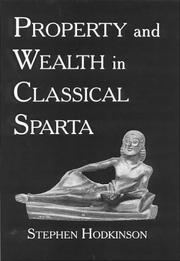
ISBN: 0715630407 Year: 2000 Publisher: London Duckworth
Abstract | Keywords | Export | Availability | Bookmark
 Loading...
Loading...Choose an application
- Reference Manager
- EndNote
- RefWorks (Direct export to RefWorks)
Article
Abstract | Keywords | Export | Availability | Bookmark
 Loading...
Loading...Choose an application
- Reference Manager
- EndNote
- RefWorks (Direct export to RefWorks)

ISBN: 0415104130 0415642957 1134848935 1280329068 0203085078 9780203085073 9781280329067 6610329060 9786610329069 9780415104135 9781134848935 9781134848881 1134848889 9781134848928 1134848927 9780415642958 Year: 1994 Publisher: London: Routledge,
Abstract | Keywords | Export | Availability | Bookmark
 Loading...
Loading...Choose an application
- Reference Manager
- EndNote
- RefWorks (Direct export to RefWorks)
In the past twenty years the study of Sparta has come of age. Images prevalent earlier in the 20th century, of Spartans as hearty good fellows or scarlet-cloaked automata, have been superseded by more complex scholarly reactions. As interest has grown in the self-images projected by this most secretive of Greek cities, increasing attention has focused on how individual Greek writers from other states reacted to information, or disinformation about Sparta.The studies in this volume provide new insights into the traditional historians' question, ""What actually happened at Sparta?"". But the
Literature and history --- Greek literature --- Cities and towns in literature --- History --- Congresses --- History and criticism --- Sparta (Extinct city) --- In literature --- -Literature and history --- -Cities and towns in literature --- -History and literature --- History and poetry --- Poetry and history --- Balkan literature --- Byzantine literature --- Classical literature --- Classical philology --- Greek philology --- -Congresses --- -Lacedaemon (Extinct city) --- Lakedaímon (Extinct city) --- Sparta (Ancient city) --- Greece --- Antiquities --- -History and criticism --- -In literature --- -Balkan literature --- History and literature --- History and criticism&delete& --- History&delete& --- Lacedaemon (Extinct city) --- Congresses. --- Sparta (Extinct city) in literature --- Literature and history - Greece - History - Congresses --- Greek literature - History and criticism - Congresses --- Cities and towns in literature - Congresses --- Sparta (Extinct city) - In literature - Congresses
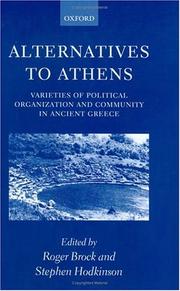
ISBN: 0198152205 1423767675 1280444754 0191541443 0585486069 9780198152200 Year: 2000 Publisher: Oxford: Oxford university press,
Abstract | Keywords | Export | Availability | Bookmark
 Loading...
Loading...Choose an application
- Reference Manager
- EndNote
- RefWorks (Direct export to RefWorks)
Democractic Athens is often viewed as the model ancient Greek state. However, there were many forms of political community in Greek antiquity. This text highlights the immense flexibility and diversity of ancient Greek civilisation and politics.
Greece --- Grèce --- Politics and government --- History --- Politique et gouvernement --- Histoire --- -Greece --- Grèce --- Comparative government. --- Greece - Politics and government - To 146 B.C
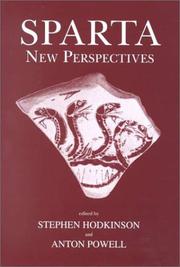
ISBN: 0715629085 9780715629086 Year: 1999 Publisher: London: Duckworth,
Abstract | Keywords | Export | Availability | Bookmark
 Loading...
Loading...Choose an application
- Reference Manager
- EndNote
- RefWorks (Direct export to RefWorks)
Stadstaten. --- Griekse oudheid. --- Geschichte. --- Kongress. --- Sparta (Extinct city) --- Sparte (Ville ancienne) --- Grèce --- Sparta. --- Sparte (ville ancienne) --- Social conditions --- Politics and government --- History --- Civilization --- Civilisation --- Histoire --- Recueils d'articles.
Book
ISBN: 1443838098 9781443838092 1299658970 9781299658974 1443837369 9781443837361 Year: 2012 Publisher: Newcastle upon Tyne, UK Cambridge Scholars Publishing
Abstract | Keywords | Export | Availability | Bookmark
 Loading...
Loading...Choose an application
- Reference Manager
- EndNote
- RefWorks (Direct export to RefWorks)
Slaves have never been mere passive victims of slavery. Typically, they have responded with ingenuity to their violent separation from their native societies, using a variety of strategies to create new social networks and cultures. Religion has been a ma
Slavery --- Abolition of slavery --- Antislavery --- Enslavement --- Mui tsai --- Ownership of slaves --- Servitude --- Slave keeping --- Slave system --- Slaveholding --- Thralldom --- Crimes against humanity --- Serfdom --- Slaveholders --- Slaves --- Religious aspects. --- Enslaved persons
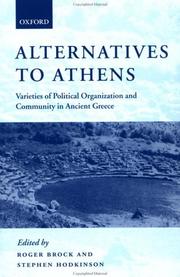
ISBN: 9780199258109 0199258104 Year: 2002 Publisher: Oxford: Oxford university press,
Abstract | Keywords | Export | Availability | Bookmark
 Loading...
Loading...Choose an application
- Reference Manager
- EndNote
- RefWorks (Direct export to RefWorks)
This volume contains eighteen essays by established and younger historians that examine non-democratic alternative political systems and ideologies--oligarchies, monarchies, mixed constitutions--along with diverse forms of communal and regional associations such as ethnoi, amphiktyonies, and confederacies. The papers, which span the length and breadth of the Hellenic world highlight the immense political flexibility and diversity of ancient Greek civilization.
Greece --- Politics and government --- Comparative government.
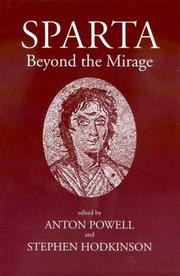
ISBN: 0715631837 Year: 2002 Publisher: Swansea : Classical Press of Wales and Duckworth,
Abstract | Keywords | Export | Availability | Bookmark
 Loading...
Loading...Choose an application
- Reference Manager
- EndNote
- RefWorks (Direct export to RefWorks)
Book
ISBN: 9781910589830 1910589837 Year: 2022 Publisher: Swansea Classical Press of Wales
Abstract | Keywords | Export | Availability | Bookmark
 Loading...
Loading...Choose an application
- Reference Manager
- EndNote
- RefWorks (Direct export to RefWorks)
Sparta (Extinct city) --- Peloponnesus (Greece : Peninsula) --- Civilization. --- Economic conditions. --- Social conditions.
| Listing 1 - 10 of 16 | << page >> |
Sort by
|

 Search
Search Feedback
Feedback About UniCat
About UniCat  Help
Help News
News